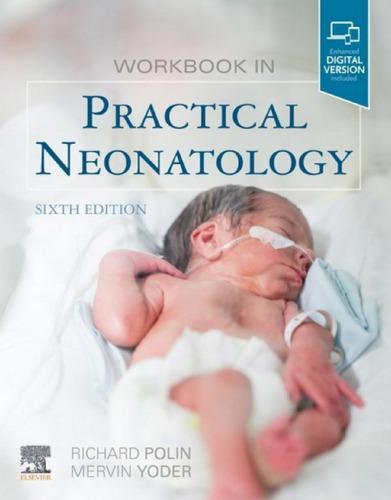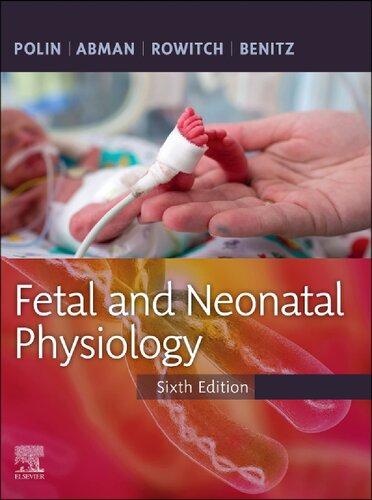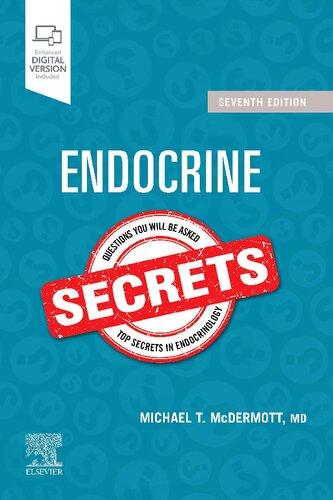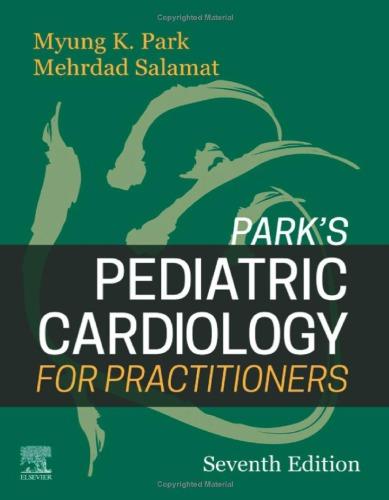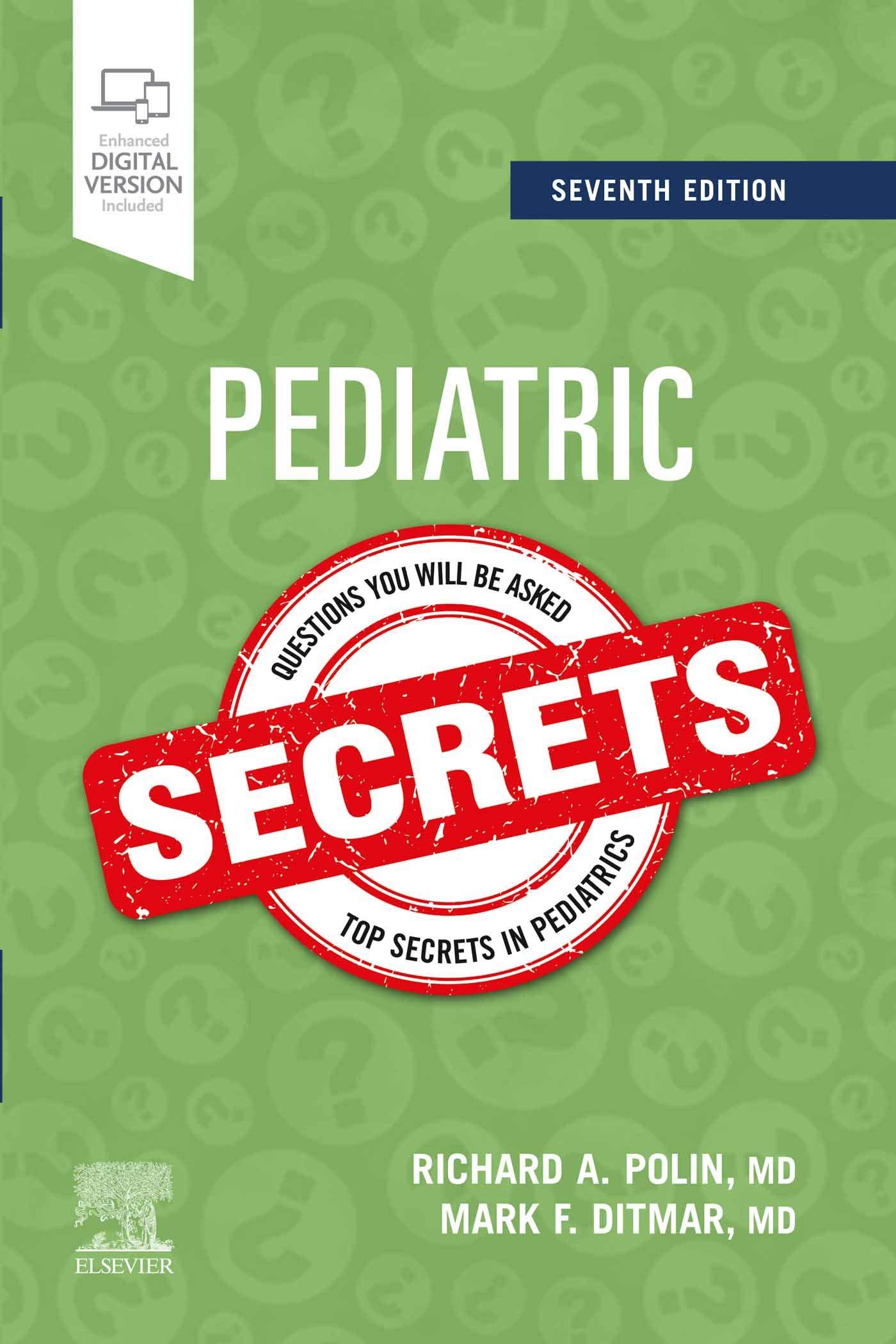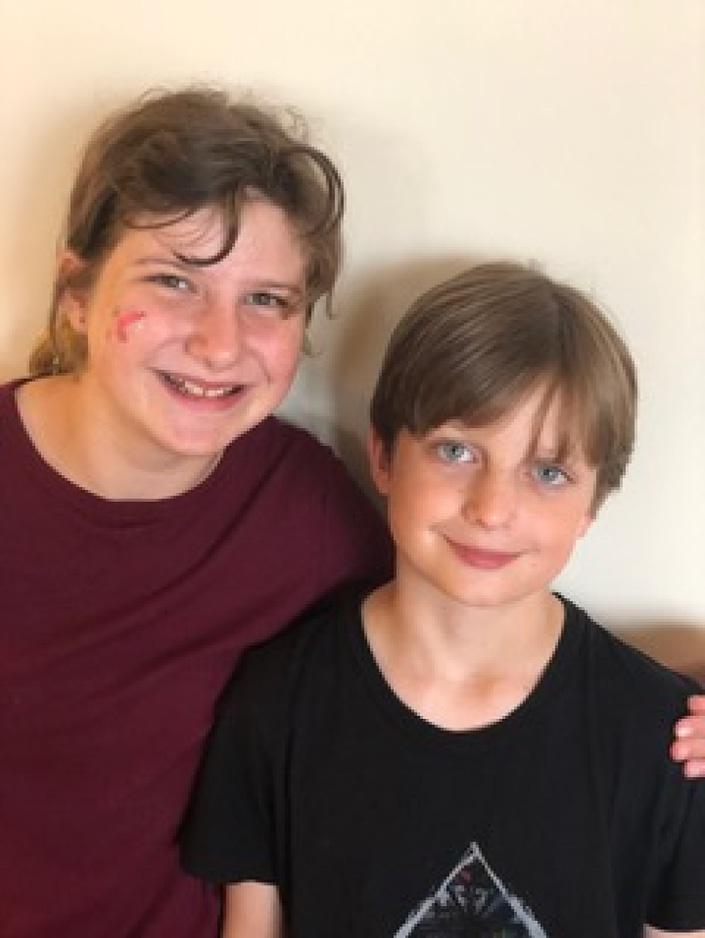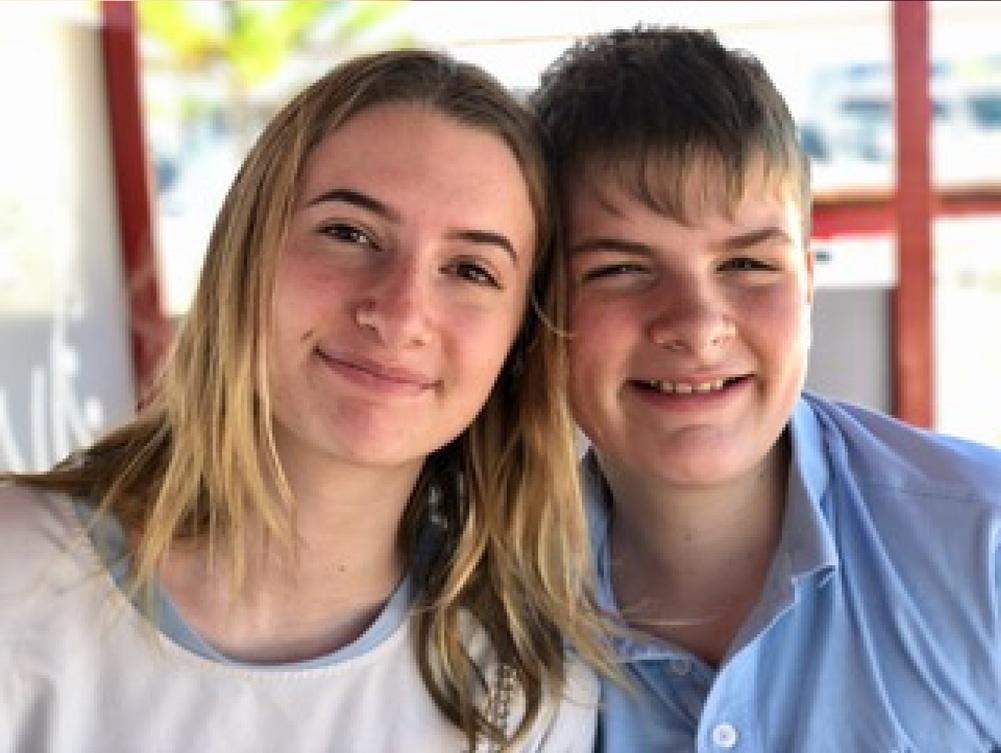TOP100SECRETS
1.Becertaintoevaluatethehipwhenapatientpresentswithkneepain,ashippathology(e.g.,Legg-Calve-Perthes disease,slippedcapitalfemoralepiphysis)frequentlymasqueradesaskneeordistalthighpain.
2.Atermnewbornwhodoesnotpassstoolwithin48hoursoflifeshouldbeevaluatedforpossibleHirschsprungdisease.
3.Thesinglegreatestcauseofmissedschoolhoursinfemalesisdysmenorrhea,butlessthan15%ofteenagegirlswith dysmenorrheawillseekmedicalcare.
4.Presentationofstrokeinchildrenvariesbyage.Neonatesandinfantscommonlypresentwithseizures,whereasolder childrentypicallyhaveacutehemiplegia.
5.Anewbornhasonly50%ofthenormalvitaminK–dependentcofactors.UnlessvitaminKisgivenintramuscularlyas partofrecommendedprophylaxis,thesecofactorssteadilydeclineduringthefirst3daysoflife,whichplacesthe infantatriskforvitaminKdeficiencybleeding.
6.Lymediseasecourseandresponsetotherapyshouldnotbefollowedbyantibodytiters,asthereiscontinuedsecretion ofantibodiesbymemorycells.BothIgMandIgGantibodiesmayremainpositiveforupto10to20yearsaftermicrobial eradication.
7.Methemoglobinemiashouldalwaysbeconsideredwhenapatientpresentswithevidenceofcyanosiswithout demonstrablerespiratoryorcardiacdisease.
8.Althoughcommonlydoneinthepastasa “testofcure,” follow-upurineculturesforaclinicallyimprovingpatient >2monthsofagearenotindicatedbecausetheyieldisextremelylow(<0.5%)inaclinicallywellchild.
9.Exclusiveuseofgoatmilk,especiallywithoutconsumptionofsupplementalsolidfoods,makesinfantssusceptibleto developingmegaloblasticanemia,asgoatmilkcontainsverylittlefolicacidcomparedwithcowmilk.
10.Mostchlamydialgenitalinfectionsinteenagersareasymptomatic(upto80%infemalesand75%inmales).
11.Themostcommonchildhood-onsetpsychiatricdisorderisoneofvarioustypesofanxietydisorders,withaprevalence ashighasoneinthreeamongadolescents,and8%havesevereimpairment.
12.Intelligibilityofspeechincreasesbyabout25%peryearfrom25%atage1yearto100%atage4years.Significantly delayedintelligibilityshouldprompthearingandlanguageevaluation.
13.Itisrareforaninfanttodevelopcongestiveheartfailure(CHF)fromsupraventriculartachycardia(SVT)in <24hours. WhenSVTispresentfor24to36hours,about20%developCHF.At48hours,thenumberincreasesto50%.
14.Gynecomastia enlargementorswellingofbreasttissue occursinasmanyas60%to70%ofadolescentboys, withmosthavingspontaneousresolutionin1to2years,although25%canhavepersistence > 2years.
15.Telogeneffluvium,themostcommoncauseofdiffusehairlossinchildren,develops2to5monthsafterastressful event(e.g.,surgery,birth,largeweightloss)andresolvesgraduallywithouttherapy.
16.The “atopicmarch” isthephenomenoninwhichaboutone-halfofinfantswithatopicdermatitiseventuallydevelop asthmaandtwo-thirdsdevelopallergicrhinitis.
17.Hyperbilirubinemiagenerallyisnotanindicationforthecessationofbreastfeeding,butratherforincreasingits frequency.
18.IndividualswithDownsyndromehavea20-foldincreasedlifetimeriskforleukemia,includinga50-foldhigherriskfor childrenduringthefirst4yearsoflife.
19.Becauseoftheinjuryrisksandnoevidencethatsupportspromotionofphysicalstrengthordevelopmentofthelower extremities,theAmericanAcademyofPediatricsrecommendsabanonthemanufactureandsaleofinfantwalkers.
20.Themostcommonspecificetiologydiagnosedinpediatricpatientswithanon-respiratorysystemicfebrileillnessafter internationaltravelismalaria.Morethanhalfoftheworld’spopulationliveinareaswheremalariaisendemic.
21.Themostidentifiablecauseofmicroscopichematuriaishypercalciuria,definedaselevatedurinarycalciumexcretion withoutconcomitanthypercalcemia.
22.IgAisthelastimmunoglobulinproducedbyanewborn,approaching20%ofadultvaluesby1yearofage,butnot reachingadultvaluesuntiladolescence.ThesephysiologicdelaysinproductionmakeitdifficulttodiagnoseIgA deficiencywithanycertaintyinchildren <2years.
23.About6%ofchildrenarestreptococcalcarriersandwillhavepositivethroatculturesbetweenepisodesofpharyngitis.
24.Kawasakidiseaseisthemostcommoncauseofidentifiableacquiredheartdiseaseinthedevelopedworld.The diagnosisshouldbeconsideredinanychildwithahighfeverlasting >5days.
25.Sixty-fivepercentofchildrenarebornwithonetofourwisdomteeth(thirdmolars),butthedecisiontoprophylactically removeasymptomatic,disease-freewisdomteethduetoanincreasedriskforfuturecomplicationsiscontroversial.
26.Althoughhematuria(>2redbloodcells[RBCs]/highpowerfield)iscommoninchildrenwithkidneystones,upto15% maynothavedetectablehematuria.
27.Acnevulgaristhatbeginsbeforeage7yearswarrantsfurtherinvestigationforendocrineabnormalitiessuchas androgenexcessorprecociouspuberty.
28.Inchildrenwithsimpleobesity(e.g.,familial),lineargrowthistypicallyenhanced;inchildrenwithendocrinopathies (e.g.,Cushingsyndrome,hypothyroidism),lineargrowthisusuallyimpaired.
29.Themostcommoncauseofpersistentseizuresinchildrenisaninadequateserumantiepilepticlevel.
30.Geneticinfluencesarestronginpediatricnocturnalenuresis.Ifbothparentswereenuretic,achild’slikelihoodisabout 75%;ifoneparentwasinvolved,thelikelihoodisabout50%.
31.Duringthefirstyearoflife,hypotoniaismorecommonthanhypertoniaininfantswhoareultimatelydiagnosedwith cerebralpalsy.
32.Inpatientswithsicklecelldisease,useoftranscranialDopplerultrasoundtomeasureintracranialbloodflow andregulartransfusionstoreducethehemoglobinScontentforthosewithabnormalvaluescansignificantlylower thelikelihoodofstroke.
33.Ininfantswithsignificantgastroesophagealreflux,25%to50%spontaneouslyresolveby6monthsofage,75%to 85%by12monthsofage,and95%to98%by18monthsofage.
34.Whenvaccinationsaregivenasrecommendedintheanteriorlateralthighinaninfantorinthedeltoidmusclein toddlers >18months,aspiration(whichincreasespainandtimetoadminister)isnotrequiredbecausenolargeblood vesselsarelocatedatthosepreferredsites.
35.Aninfantwithvomiting,lethargy,hypoglycemia,andnoketonesonurinalysisshouldbeevaluatedforafatty-acid oxidationdefect.
36.Treatmentfailuresaremorecommoninosteomyelitisthaninsepticarthritisbecauseantibioticconcentrations aremuchgreaterinjointfluidthanininflamedbone,devitalizedbonemayserveasanongoingnidusforinfection, anddiagnosisofosteomyelitisismorelikelytobedelayedthandiagnosisofsepticarthritis.
37.Acutekidneyinjury(AKI)hasreplacedthetermacuterenalfailure(ARF)toreflectthemoreappropriateconceptthat smallerreductionsinkidneyfunction(shortofcompleteorganfailure)havesignificantclinicalrepercussionsinterms ofmorbidityandmortality.
38.Aninfantwithnonsyndromicsensorineuralhearinglossshouldbetestedformutationsintheconnexin26gene. Mutationsinthatgenecontributetoatleast50%ofautosomalrecessivehearinglossandabout10%to20%ofall prelingualhearingloss.
39.Storageofurinespecimensinroomairpriortocultureisoneofthemostcommoncausesoffalse-positiveculture results,asentericorganismshaveagrowth-doublingtimeof12.5hoursinroomair,whichmakescolonycounts unreliableasaguide.
40.Womenwithprimarygenitalherpessimplexvirus(HSV)infectionswhoaresheddingHSVatdeliveryare10to30times morelikelytotransmitthevirusthanwomenwithrecurrentinfection.
41.Bewaryofmidlinefacialdermoidcysts,astheycarryanincreasedriskforintracranialconnections.
42.Headachesthatawakenchildrenfromsleep,areassociatedwithvomitingwithoutnausea,aremadeworseby strainingorcoughing,andhaveintensitychangeswithchangesinbodypositionareconcerningforpathologythatis causingincreasedintracranialpressure.
43.Themostcommongeneticlethaldisease,definedasadiseasethatinterfereswithaperson’sabilitytoreproduceasa resultofearlydeathorimpairedsexualfunction,iscysticfibrosis.
44.About10%to20%ofpatientswithRockyMountainspottedfeverdonotdeveloparash,soahighindexofsuspicionis neededforanypatientinanendemicareawhopresentswithfever,myalgia,severeheadaches,andvomiting.
45.Inchildrenorteenagerswithapalpablesolitarythyroidnodule,anaggressivediagnosticevaluationisneededbecause 20%to25%willhaveacarcinoma.
46.Myocarditisshouldbesuspectedclinicallywhenthereistachycardiaoutofproportiontofever,tachypnea,aquiet precordium,muffledhearttones,galloprhythmwithoutmurmur,andhepatomegaly.
47.Adolescentswithattention-deficit/hyperactivitydisorder(ADHD),particularlythosewhoareuntreated,areat increasedriskforhigh-riskbehaviors,includinghigherratesofsexuallytransmittedinfections(STIs),substance abuse,automobileaccidents,andschoolproblems(gradefailure,droppingout,expulsion).
48.Amalechildwithaliverabscessshouldbeconsideredtohavechronicgranulomatousdiseaseuntilprovenotherwise.
49.Tumorlysissyndrome,anoncologicemergencyofspontaneousorchemotherapy-inducedmassivebreakdownof tumorcells,resultsinhyperuricemia,hyperphosphatemia,secondaryhypocalcemia,andhyperkalemia,which increasestheriskforsuddendeath.
50.Prematurebabiesshouldbeimmunizedinaccordancewithpostnatalchronologicage.
51.Amenorrheawithunilateralabdominalorpelvicpain,irregularvaginalbleeding,andabdominalpainwithapositive pregnancytestareindicativeofectopicpregnancyuntilprovenotherwise.
52.Carbonmonoxidepoisoningisoftenmisdiagnosedbecausethepresentingsymptomscanbeflu-like.
53.Bilingualchildrendevelopspeechmilestonesnormally;two-languagehouseholdsshouldnotbepresumedasacause ofspeechdelay.
54.Becauseoftheincreasedfrequencyofpotentialcoexistingautoimmuneconditions,childrenwithtype1diabetes mellitusshouldbescreenedforthyroiddisordersandceliacdiseasesoonafterdiagnosis.
55.Afterironsupplementationforiron-deficiencyanemia,thereticulocytecountshoulddoublein1to2weeks,and hemoglobinshouldincreaseby1g/dLin2to4weeks.Themostcommonreasonforpersistenceofiron-deficiency anemiaispoorcompliancewithsupplementation.
56.Apoporsnapsensationinthesettingofacutekneeinjuryisusuallyassociatedwithananteriorcruciateligament injury,ameniscalinjury,and/orpatellarsubluxation.
57.Theleadingcauseoffatalitiesrelatedtoinhalantabuseinadolescentsarefatalarrhythmias,oftenfromvolatile hydrocarbons,whichaffectmyocardialcellmembranes.Oneinfiveadolescentswhodieinthissettingareusing inhalantsforthefirsttime.
58.Afallingserumsodiumconcentrationduringdiabeticketoacidosis(DKA)treatmentisworrisomebecauseitindicates eitherinappropriatefluidmanagementortheonsetofsyndromeofinappropriateantidiuretichormone(SIADH)andcan heraldimpendingcerebraledema.
59.Intheevaluationofchildrenwithconstipation,themostimportantphysicalexaminationcomponentistherectal examination,becauselargeamountsofstoolintherectalvaultalmostalwaysindicatefunctionalconstipation.
60.Signsofclavicularfracture,thebonemostcommonlyfracturedduringdelivery,includeasymmetricmovementofthe upperextremities,cryingwithpassivemotionofanupperextremity,andpalpablecrepitanceovertheclavicular region.
61.Mostamblyopiaisunilateral;visiontestingsolelywithbotheyesopenisinadequate.
62.Crawlingisoneoftheleastvaluablemarkersofdevelopmentbecausethereisenormousvariabilityinthetimingof crawling,andasignificantpercentageofnormalinfantsnevercrawlbeforewalking.
63.Polycysticovariansyndrome,whichaffectsupto10%ofreproductive-agewomen,shouldbesuspectedinoverweight orobeseteenagerswithamenorrhea/oligomenorrheaandsignsofhyperandrogenism(e.g.,hirsutism,acne).
64.Separationoftheumbilicalcordoccursnormally,onaverage,by10daysoflife(range:3to45days).Delayed separationcanoccurinpatientswithleukocyteadhesiondeficiencytype1(LAD1),aconditionofimpairmentof leukocytemobilizationintoextravascularsites.
65.Mostumbilicalhernias <0.5cmspontaneouslyclosebeforeapatientis2yearsold.Ahernia >2cmmaystillclose spontaneously,butitmaytakeupto6years.
66.AteenagerwithdelayedpubertyandapoorsenseofsmellmayhaveKallmannsyndrome,adefectingonadotropinreleasinghormone,whichisassociatedwithmaldevelopmentoftheolfactorylobes,resultinginanosmiaorhyposmia.
67.Upto20%ofadolescentswithmenorrhagiamayhaveableedingdisorder,mostcommonlyvonWillebranddisease.
68.Withoutaboosterafterage5years,pertussisprotectionagainstinfectionisabout80%duringthefirst3yearsafter immunization,droppingto50%after4to7years,andtonear0%after11years.
69.Whenacutegastrointestinal(GI)bleedingoccursinchildren,itmaytake12to72hoursforfullequilibrationofa patient’shemoglobintooccur.Vitalsignsaremuchmoreusefulforguidingpatientmanagementintheacutesetting.
70.Ingirls’ activitiesthatemphasizeleanness(e.g.,gymnastics,ballet,diving),bewareofthefemaleathletetriadof menstrualdysfunction,lowbonemineraldensity,andlowenergyavailability(withorwithoutdisorderedeating).
71.Threeormoreminormalformationsshouldraiseconcernaboutthepresenceofamajormalformation.
72.Upto10%ofnormal,healthychildrenmayhavelow-level(1:10)positiveantinuclearantibodytestingthatwillremain positive.Withoutclinicalorlaboratoryfeaturesofthedisease,itisofnosignificance.
73.Anoverweight5-year-oldisfourtimesaslikelytobeanoverweightteenager,whichhighlightstheimportanceof addressingobesityatanearlyage.
74.Thecharacterofnasalsecretions(e.g.,purulent,discolored,tenacious)doesnotdistinguishviralfrombacterial causes,asmucopurulentrhinitisoftenaccompaniesthecommoncold.Earlytreatment(<7to10days)ofpurulent nasaldischargeisacommoncauseofantibioticoveruse.
75.Themostcommoncauseofchronicpelvicpaininadolescentswithoutahistoryofpelvicinflammatorydiseaseis endometriosis.
76.Asanaidinthediagnosisandtreatmentofpneumonia,correlationbetweenthroatandnasopharyngealbacterial culturesispoorandoflimitedvalue.Healthychildrenmaybecolonizedwithawidevarietyofpotentiallypathogenic bacteria(anexceptionbeing Bordetellapertussis).
77.Themostcommonclinicalpresentationofjuvenilepolypsinchildrenispainlessrectalbleeding,withuptoone-thirdof patientshavingchronicbloodlosswithmicrocyticanemia.
78.InfantsinfectedintheperinatalperiodwithhepatitisBhavea >90%chanceofdevelopingchronichepatitisB infection,andofthese,25%goontodevelophepatocellularcarcinoma.
79.Alwaysconsiderovariantorsioninthedifferentialdiagnosisofabdominalpainingirls,particularlyduringtheagesof9 to14years,whenovariancystsaspotentialleadpointsaremorecommonbecauseofthematuringreproductive hormonalaxis.
80.Basilar-typemigraine,whichoccursinupto19%ofchildhoodmigraines,islikelyinachildwithahistoryof headaches,afamilyhistoryofmigraines,andpresentationwithaspinningsensationanddoublevisionfollowedbyan occipitalheadache.
81.Flexibleflatfeet,whichoccurin15%to20%ofthepediatricpopulation,canbedistinguishedfrompathologic varietiesofrigidflatfeetbynotingthatwhenachildissittingorstandingontiptoes,thearchgetsbiggerandlooks normal.
82.Neonateswithmidlinelumbosacrallesions(e.g.,sacralpits,hypertrichosis,lipomas)abovetheglutealcreaseshould havescreeningimagingofthespineperformedtosearchforoccultspinaldysraphism.
83.ApatientwithLymediseaseorsyphiliswhodevelopsfever,myalgias,andchillsafterstartingantibiotictherapylikely hasaJarish-Herxheimerreaction,whichisthoughttobemediatedbyendotoxinreleaseastheorganismisdestroyed. Thismaybemistakenforanallergicreactiontotheantibiotic.
84.Inchildrenwithesophagealfoodimpaction,endoscopyandbiopsyrevealanunderlyingpathologicandpotentially treatableetiologyinthemajorityofpatients.Inteenagers,themostcommoncauseiseosinophilicesophagitis.
85.Syncopeismorelikelytobeofacardiacnatureifthereissuddenonsetwithoutpriordizzinessorawareness, occurrenceduringexercise,historyofpalpitationsbeforefainting,syncoperesultsinaninjuryfromafall,and/ora positivefamilyhistoryofsuddendeath.
86.Thebestmeasureofcognitivefunctioninayoungerchildisreceptivelanguage,whichshouldbeassessedinafashion thatisfreeofmotorrequirements.
87.Seizureswithfeverinpatients >6yearsofageshouldnotbeconsideredfebrileseizures.
88.Cytomegalovirusisthemostcommoncongenitalinfection,upto1.3%insomestudies,but80%to90%ofinfected neonatesareasymptomaticatbirthorinearlyinfancy.
89.Occasionalstrabismusiscommoninyounginfantsbecausethemaculaandfoveaarepoorlydevelopedatbirth,but interventionshouldbeconsideredforsymptomsthatpersistbeyond2to3monthsofage.
90.UnlikeAmericanHeartAssociationchangesinvolvingout-of-hospitalresuscitationinadults,compression-only cardiopulmonaryresuscitation(CPR)isnotrecommendedforchildren,asventilationremainsvitalforinfantsand children.Mostpediatricarrestsoriginatefromanoncardiacnaturewithprogressivetissueinjuryandhypoxiadueto respiratoryfailureorshock.
91.Achildwithsystemicjuvenileidiopathicarthritis(JIA)whobecomesillwiththrombocytopenia,profoundanemia,and markedlyelevatedtransaminaseslikelyhasmacrophageactivationsyndrome,acomplicationinvolvingmassive upregulationofT-cellandmacrophagefunctionandvastreleaseofproinflammatorycytokineswithsubsequent hemophagocytosis.
92.Becauseirreversiblehistologicchangescandevelopin4to8hoursaftertheonsetoftesticulartorsion,timely diagnosisiscritical.Testicularsalvageratesare <10%ifsymptomdurationis24hoursormore.
93.Inatoddlerwithsuspectedidiopathicthrombocytopenicpurpura(ITP),thepresenceofsplenomegalywarrantsmore aggressiveevaluationforanassociatedproblem(e.g.,collagen-vasculardisease,hypersplenism,leukemia,glycogen storagedisease).
94.Asthmararelycausesclubbinginchildren.Considerotherdiseases,particularlycysticfibrosis.
95.Theoptimaltimeframeforsurgeryforapatientwithanundescendedtesticleis <12monthsofagebutnot <6monthsofageinordertooptimizefertilitypotentialandtodecreasetheriskforfuturetesticularcancer. Spontaneousdescentafter9monthsisunlikely,andultrastructuralchangesintheseminiferoustubulescanoccurin thesecondyearoflife.
96.AsexuallyactiveteenagerwithadnexalandrightupperquadranttendernesslikelyhasFitz-Hugh–Curtissyndrome,an infectiousperihepatitiscausedbygonococcior Chlamydia bydirectspreadfromapelvicinfectionalongthepericolic gutterstotheliver,whichresultsininflammationandcapsularadhesions.
97.ThemostfrequentcauseofchronicallyelevatedaminotransferasesamongchildrenandadolescentsintheUnited Statesisnonalcoholicfattyliverdisease(NAFLD),whichiscommonlyseeninobesepatientswithmetabolic syndrome.
98.Nearly100%ofinfantswithchlamydialpneumoniaareafebrile,andlessthanhalfhaveinclusionconjunctivitis.
99.Leftshoulderpainafterabdominaltraumaisaworrisomesignthatcouldrepresentbloodaccumulatingunderthe diaphragm,whichresultsinpainreferredtotheleftshoulder(Kehrsign)duetosplenicinjury.
100.Themostcommonworldwidecauseofchronicgastrointestinalbloodlossishookworminfection,whichisoften associatedwithiron-deficiencyanemia.
Another random document with no related content on Scribd:
"Why, it does come pretty nearly to that, I am afraid. It comes to the fact that duties clash in a case like this; so that, one's conscience being at fault, an appeal to the law must settle the matter. I see no crime in Elizabeth's taste, apart from the means she may take to gratify it; but the law pronounces her wrong, so we must conclude she is wrong."
"Duties do, indeed, clash," replied Matilda; "and if so painfully in one case, what must be the extent of the evil if we consider all who are concerned? Even in this little neighbourhood, here is Mr. Pim unable to teach honour, as he says, without giving the notion that it is a merit to conceal fraud, and pointing out a whole class as objects of contempt and hatred. The dwellers near, almost to a man, look upon the government as a tyrant, its servants as oppressors, its laws as made to be evaded, and its powers defied. Oaths are regarded as mere humbug; and the kindliest of social feelings are nourished in direct relation to fraud, and pleaded as its sanction. There is not a man near us who does not feel it necessary, nor a woman who does not praise it as virtuous, nor a child who is not trained up in the love and practice of it. This is the morality which one institution teaches from village to village all along our shores,--mocking the clergyman, setting at nought the schoolmaster, and raising up a host of enemies to the government by which it is maintained; and all for what?"
"To help us in our national money matters, in which, in truth, it does not very well succeed," observed the Lieutenant.
"And to protect the interests of certain classes of its subjects," replied Matilda, "in which, if most people say true, they succeed as little."
"Spitalfields is in a worse state than ever," observed the Lieutenant; "and there are terrible complaints from our glovers and our lace-makers."
"And if not," continued Matilda--"if protection availed to these people, the case would be very little better than it is now. Money prosperity is desirable only as it is necessary to some higher good,-to good morals and happiness; and if it were, in fact, secured to our glovers, and silkmen, and lace-makers, it would be purchased far too dear at the expense of the morals of such a multitude as are
corrupted by our restrictive laws. There can be nothing in the nature of things to make the vexation and demoralization of some thousands necessary to the prosperity of other thousands. Providence cannot have appointed to governments such a choice of evils as this; and----"
"And you, my dear, for your share, will therefore withhold your allegiance from a government which attempts to institute such an opposition."
"It is rather too late an age of the world for me to turn rebel on that ground," replied Matilda, smiling. "Such governments as we were speaking of are dead and gone, long ago. Our government is not granting any new protections or prohibitions, surely!"
"But I thought you would quarrel with it for not taking away those which exist. I thought you would give it your best blessing if they sent an order to all us Preventive people to vacate our stationhouses and march off."
"I certainly felt more disaffected to-day than ever in my life before," observed Matilda. "To think that, in a country like this, anybody may be stopped and searched upon mere suspicion!"
"With the privilege of demanding the decision of a magistrate, remember."
"Which magistrate may order the search, if he finds sufficient ground of suspicion. And this outrage is to take place as a very small part of the machinery for protecting the interests of certain classes, to the great injury of all the rest; and especially, as many of themselves say, to their own. It makes one indignant to think of it."
"It is the law, my love; and while it exists, it must be obeyed. I must order my men to stop you, if you should chance to sympathize in Elizabeth's tastes. Hey, Matilda?"
"Do, by all means, when you find me smuggling; but perhaps my share of the temptation may soon be at an end. I trust all this distress that you speak of will end in bringing into an active competition with foreigners those of our people who are now sitting with their hands before them, perceiving how the gentry of England are apparelled in smuggled goods. No fear for our occupation, you know. There will still be brandy and tobacco, on which, as we do not
grow them ourselves, government will call for so high a duty as will encourage smuggling. No prospect of your being useless yet a while."
"Nor of our neighbours being as loyal as you would have them."
"Nor of their living at peace, and in frank honesty."
"Nor of Pim's making his scholars moral."
"Nor of our manufacturers having fair play."
"Nor of the same justice being done to the revenue. Alas! how far we are from perfection!"
"Yet ever tending towards it. Unless we believe this, what do we mean by believing in a Providence? since all evidence goes to prove that its rule is infinite progression. Yes, we are tending upwards, though slowly; and we shall find, when we arrive in sight of comparative perfection, that a system of restriction which debases and otherwise injures all parties concerned, is perfectly inconsistent with good government."
"Then shall I have earned my dinner in some other, and, I trust, a pleasanter, way than to-day," observed the Lieutenant. "I shall never get reconciled to my office, Matilda, especially while I hear of brother officers abroad----"
"Oh! you are dreading your patrol to-night, because it is beginning to snow," said Matilda, smiling. "You shall go in, and fortify yourself with some duty-paid brandy and untaxed water; and then, if you will let me go with you again, we will defy the smugglers as manfully as if they were to be the enemies of good order for evermore."
"You shall not go out in the dark again, my love. It took all my manfulness from me to see you so near the edge of the cliff in a wind which might drive you out as if you were a sea-gull. The place looks scarcely fit for you on the brightest of days; you have no chance out of doors on a gusty night."
CHAPTER VI.
A NIGHT WATCH.
The night of the gipsy late-wake was one of the clearest and coldest moonlight. Such a night,--when the smallest skiff showed black on the glistening sea, and every sailing bird cast its shadow on the chalky cliff, and each stationary figure on the heights exhibited a hard outline against the sky,--was little fit for smuggling adventure; yet the officers of the Coast Guard had a strong impression that a landing of contraband goods was to be attempted, in defiance of the lady moon, and of the watchers who "blessed her useful light." A gipsy festival afforded an excellent pretence for collecting the country people in sufficient force to brave the guard; and it was suspected that the people themselves thought so, as tidings of the festival were most industriously spread through all the country, and certainly very eagerly received. Lieutenant Storey held consultations with his brother officers at all the stations near; and every precaution was taken to enable a great force to assemble with speed at the points where it seemed pretty certain that a landing would be attempted. One or two trusty men were sent to overlook the wake from a height, that they might report the numbers and apparent disposition of the people; and Lieutenant Storey visited these men on their posts soon after the beginning of the ceremony.
"Well! what news?" said Matilda, anxiously, as the Lieutenant entered the room where his wife, mother, and sister were waiting supper for him.
"Why, it is a fine freezing night," he replied, rubbing his hands, and accepting the seat which was offered him close by the blazing fire. "So you have Elizabeth to keep you company, as I advised you.
That is very well, as I rather think you will not be persuaded to go to bed till late. And you, too, mother! Who would have thought of your climbing up to us so late in the day?"
"But the gipsies!" cried the ladies. "Did you see the wake?"
"I heard more than I saw of it; for the banks are so high that one could only catch a glimpse of a few heads now and then. But there was a strong glare from their torches, there being little moonlight, I suppose, in the hollow way: and their noise is really inconceivable. Such yelling and howling, and what I suppose they call singing! They will wake up all the sheep in the pens for a mile round."
"I am afraid there are a great many collected," observed Matilda.
"I should think there must be, for I never heard any gabble or din to compare with it, except when the wind and the sails are wrangling in a storm at sea. But come, let us have supper. I must be gone again presently; and this is not an air to take away one's appetite."
His mother inquired whether they could learn anything of the progress of events by looking out of the windows, or whether they must wait for news till his return. He replied,
"You will see nothing by going to the window but as fine a moonlight sea as ever you saw; and the light-house, and perhaps poor Nicholas staring about him, as he is bound to do. If there is any affray, it will be far out of your sight. We keep our eyes upon Birling and Crowlink Gap. Either of them is an easy place of rendezvous from the wake. You will be as still as death here, and I advise you all to go to sleep till I knock you up to let me in."
The mother and sister wondered what he thought they could be made of to go to bed at such a time. Matilda piled fresh logs on the fire, and looked to see that the lamp was trimmed.
"I'll tell you what,--I'll desire Nicholas to come, from time to time, to tell you whether he hears or sees anything or nothing," said the Lieutenant. "I have put him on the nearest beat, where I am pretty sure of his having nothing to do; and he can just step to the gate, if you like to be at the trouble of hearing that he has nothing to tell."
"Do be less presumptuous, my dear son," said Mrs. Storey. "How dare you make sure of nothing happening?"
"It was only a hasty word, mother. I have not been presumptuous in reality, as you would say if you saw how completely we are prepared. More ale, if you please, Elizabeth. And now, I must not stay any longer. I shall be sure to tell Nicholas: but you will not detain him from his post."
Matilda ran out before him to have his parting kiss at the gate, and to watch him out of sight. The full light from the beacon turned at the moment upon her face, stronger than the moonlight, and showed that tears were upon her cheek.
"I cannot scold you, love," said her husband, as he wiped them away. "I do pity you women that have to sit waiting at home when anything is to happen. I could fancy myself crying like a baby if I were obliged to do so. But go in now, there's a good girl."
"The moment you are out of sight. I suppose you really cannot tell,--you cannot even tell me,--when you are likely to be home again."
"Impossible. It may be two hours, or it may be twelve."
Matilda had only to pray that it might be two, while she watched her husband on his way to Nicholas's beat, where he stopped to speak with the figure perched upon the brow of the cliff. Presently the figure might be seen to touch its hat; the Lieutenant waved his hand towards the station-house, and speedily disappeared, leaving Matilda to re-enter the parlour, whose clear fire, double windows, and listed doors she would willingly have exchanged for the biting air on Hotcombe Flat, by her husband's side.
During the hour which elapsed before Nicholas lifted the latch of the gate, whose welcome slick brought all the ladies to the door, Matilda had wished twenty times that she was alone. Elizabeth was full of groundless fears of her own devising, while she ridiculed those of other people; and Mrs. Storey gave a lecture on patience every time Matilda moved on her chair, looking up in her face with all possible anxiety, however, at each return from an excursion to the upper windows. The methodical Nicholas was more tiresome still. He began with an explanation of what his orders were about giving intelligence to the ladies, and of his purpose in now appearing before them. He proceeded with an account of where he had stood,
and how he had looked round and listened, and what he had been thinking about; and it was only at the last that it came out that he had seen and heard nothing particular.
"And do you think you could hear a pistol-shot from Birling Gap, or from so far as Crowlink Gap?"
Nicholas could not answer for it, having never heard a pistol fired from either place while on duty on his present beat; but he soon recollected that his officer had told him that it was a very calm night, and that he could certainly be able to hear the sound in question from the farthest of the Seven Sisters; and therefore Nicholas fully believed that he should hear a pistol as soon as fired.
"Very well," said Matilda, venturing upon such a breach of discipline as handing him a glass of ale. "Now we will not detain you: we were desired not; but come again in an hour, and sooner, if anything happens."
Nicholas's heart, which was always warm towards the lady, was rarefied by the honours and benefits of this night. To be appointed, in some sort, her special servant,--to be treated with kind words from her lips, and with ale from her own hands,--was enough, in combination with the ale itself, to raise his spirits to the highest pitch of which, as a sober man, he was capable. He could scarcely refrain from whistling as he went back to his beat, and was actually guilty of humming "Rules Britannia," as he flung himself down in a sort of niche on the very brow of the dizzy cliff, whence he was wont to gaze abroad over the expanse.
"'Rule, Britannia!'--Ay, that lady is worth a thousand of the bigger and smarter one, and the old one too, if a poor man may think so.-'Britannia rule the waves.'--Hoy, hoy! where did this sloop come from, that I did not see her before? She's waiting for an early cargo of chalk, I'll be bound; but it is odd I did not see her before, only that she lies so close under, one could not see without looking over. 'And come again in an hour,' says she, 'or sooner, if anything happens.' I wonder how the hour goes.--'Britons never shall be slaves!'--If I had my mother's old watch, now! Bless her! she's now asleep, I suppose, in the bed with the green checked curtains. She says she thinks of me in her prayers, and has all the sea before her
as she goes to sleep, and me marching above it, helping to guard the nation.--'Britannia rule the waves!'--It is only a fair turn for me to think of her when she is asleep, as I hope she is now. Lord! how she used to beat me! and all, as she says now, for tenderness, to make a great man of me. To be sure, I never guessed it at the time.-'Britons never shall be slaves! Never! never!' I don't know that I had not best walk; it is so different sitting here from what it is when the sun is out, platting straw for my hat. It is time I had a new hat; I thought I saw the lady glancing at it. Think of her taking notice of such little things! Kind heart! 'Come again within the hour,' says she, 'and sooner, if anything happens.' That's she looking out, I warrant, where there is a little bit of light from the window. There! 'tis gone. 'Tis the will of Providence that she should notice me so. I wish she knew how my mother thinks of me: but that is no doing of mine, either; it is the will of Providence too; and I doubt whether anybody is so happy as, by the will of Providence, I am, with my mother, and the people here all so harmless to me, and the lady! And it is something to see such a bright sea as this, so like what I saw in the show-box at Weyhill fair, when my mother treated me, then a young boy. I am sure everybody is wonderfully kind to me. I wonder how the hour goes. It is bitter cold, to be sure; and I think yon bit of shelter is best, after all.--'Britons never, ne--ver----'"
And Nicholas once more crouched in his recess, where he rocked himself to the music of the waves, and looked in vain over the wide expanse for the smallest dark speck, in watching which he might find occupation. He soon found that his observation would have been better bestowed nearer home. While walking, he had disdained the well-worn path along the chalk line, strewed within a few feet of the verge for the guidance of the watchers on dark nights. As it was light enough for safety, he availed himself of the opportunity of varying his beat, and trod the less bare path from the chalk line to the very edge of the cliff. He had looked straight before him, whether his back was turned north or south, giving no attention to the right hand or the left. He had also been too hasty in his conclusion that the vessel which lay below, in the deep, broad shadow of the cliffs, was a chalk sloop, waiting for the tide.
By leaning forwards a little, any one in Nicholas's present seat could command a view of a winding and perilous, almost perpendicular, track, which ascended from the spot where the gipsies had assisted at the last unloading of a smuggling vessel. Something like rude steps occurred at small intervals in this track; but they were so imperfect, and it was so steep, that the assistance of either ropes or mutual support was necessary to those who would mount, with or without a load on their shoulders. As the tide had till now been too high to permit access to this spot by the beach, it was one of the last in which Nicholas could have expected to see foes. For want of something to do, he picked two or three flints out of a layer which was bedded in the chalk within reach, and amused himself with sending them down the steep, in order to watch what course they would take. Leaning over, to follow with his eye the vagaries of one of these, his ear was struck by a bumping, dead sound, which could not be caused by his flint. Looking a little to the right, without drawing back, he perceived something moving in the shadowy track. But for the sound which had excited his suspicions, he would have concluded that some cliff-raven or sea-bird had been disturbed in its hole, and he watched intently for a few seconds to discover whether this was not the case; but it soon became evident to his sharpened sight that there was a line of men laboriously climbing the track, each with his two small tubs braced upon his shoulders. Whether they had a strong rope by which each might help himself, or whether each supported the one above him, could not be discovered from the distance at which Nicholas sat; nor could he guess whether they were aware of his being so near.
He started up, and stood in the broad moonlight, fumbling for his pistol, which was not quite so ready to his hand as it ought to have been. A subdued cry spread up and down, from mouth to mouth, among his foes, a large body of whom appeared instantly on the ridge, from the hollow where they had collected unobserved. One of them cried,--
"Hand over your pistol, lad, and sit down quietly where you were, and we will do you no harm."
To do anything but what his officer had desired was, however, too confusing to Nicholas's faculties to be borne. The order to fire as soon as smugglers were perceived came upon his mind, as if spoken at the moment in the Lieutenant's own voice, and saved him the trouble of all internal conflict. He fired, and was instantly fired upon in turn, and wounded. As he staggered far enough back from the verge to fall on safe ground, he had the consolation of hearing (after the cloud of flapping sea-birds had taken themselves far out to sea) a repetition of shots along the cliffs on either hand, fainter and shorter in the increasing distance. The ominous roll of the drum,-the most warlike signal of the smugglers,--was next heard from the hollow to the right, and more sea-birds fluttered and screamed. Silence was gone; the alarm was given; and poor Nicholas need not resist the welcome faintness that stretched him on the grass.
The smugglers, annoyed by former repeated failures in their attempts to intimidate or gain over the Preventive watch, were now exasperated by Nicholas's unflinching discharge of his duty; and they determined to make an example of him, even in the midst of their preparations to resist the force which they knew to be on the way to attack them. The first necessary precaution was to range the batmen who had been collected by the sound of the drum, in two rows, from the vessel to the foot of the cliff, and again from the verge of the cliffs to where the carts were stationed, surrounded with guards. This being done, their pieces loaded, and their bludgeons shouldered, a small party was detached to take possession of the wounded man. On raising him, it was found that he was not dead, and that it was by no means certain that his wounds were mortal. When he recovered his senses, he felt himself lifted from the ground by a rope tied round his middle, and immediately after was being lowered over the edge of the precipice, carefully protected from being dashed against the face of the cliff by the men who stood at regular distances down the track, and who handed him from one to the other till he reached the bottom, where two stout men received him, and supported him on either side to a little distance along the shingle.
"What are you going to do with me?" he faintly asked; but they made no answer.
"For God's sake spare my life!"
"Too late for that, lad," replied one.
"No, not too late," said Nicholas, with renewed hope. "I don't think you have killed me. I shall get well, if you will let me go."
"Too late, lad. You should not have fired."
"You are going to murder me then," groaned the victim, sinking down upon a large stone where he had often leaned before, it being the one from which he was wont to look out to sea. "I did not expect it of you, for your people have always behaved very well to me. Everybody has been kind to me," he continued, his dying thoughts getting into the train which the spot suggested. "But, if you will do me one more kindness, do, some of you, tell the lady at the station why I could not come as she bade me. 'Come within the hour,' says she----"
He stopped short on hearing two pistols cocked successively. No duty to be done under orders being immediately present to his mind, a paroxysm of terror seized him. He implored mercy for his mother's sake, and, with the words upon his lips, sank dead before the balls were lodged in his body as in a mark.
The proceeding was witnessed by some of his comrades, and by his officer, from the top of the cliff; and fierce were the cries and numerous were the shots which followed the murderous party, as they quickly took up the body, and fell back among the crowd of smugglers within the deep shadow where they could no longer be distinguished.
The party being three hundred strong, any resistance which the Preventive Force could offer was of little avail to check their proceedings, as long as they were disposed to carry them on. They persevered for some time in landing, hoisting up, and carting away their tubs, the batmen keeping line, and frequently firing, while the carriers passed between with their burdens. At length, a shot from one of the guard, which took more effect than was expected, seemed to occasion some change in their plans. They drew in their apparatus, ascended the track in order, bearing with them the bodies
of their slain or wounded companions, and formed round the carts, in order to proceed up the country, deserting a portion of the cargo which was left upon the shore. The vessel, meanwhile, hoisted sail, and wore round to stand out to sea.
"Can you see how many are killed or disabled?" inquired the Lieutenant of one of his men. "What is this they are hauling along?"
"Two bodies, sir; whether dead or not, I can't say."
"Not poor Nicholas's for one, I suppose."
"No, sir; they have both their faces blacked, I see."
"We must get Christian burial for Nicholas, if it be too late to save him," said the Lieutenant to his men, who were boiling with rage at the fate of their comrade.
"They have pitched him into the sea, no doubt, sir, unless they have happened to leave him on the beach as a mockery."
The procession passed with their load, like a funeral train; and to stop them would only have occasioned the loss of more lives. There were no stragglers to be cut off, for they kept their corps as compact as if they had been drilled into the service, and practised in an enemy's country. It was, in fact, so. They had been trained to regular defiance of laws which they had never heard spoken of but in terms of hatred; and whenever the agents of government were around their steps, they felt themselves in the midst of enemies.
When the smugglers had proceeded so far inland as to be out of danger, they made a halt, and gave three cheers,--an exasperating sound to the baffled guard.
"Let them cheer!" cried the Lieutenant, "our turn will come next. Down to the beach, my lads, before the tide carries off what belongs to you there. If any of you can find tracks of blood, it may not be too late for poor Nicholas, after all. Down to the beach, and seize whatever you can find."
He remained for a few moments on the steep, ranging the horizon with his glass, internally cursing the rapid progress that the lugger (which few but Nicholas would have taken for a sloop, however deep the shadow) was making in her escape.
"The cutter always contrives to be just in the wrong place," thought he, "or to arrive too late when called. She will come, as she
did before, full sail, as soon as the smuggler has got out of sight, and changed her course."
On joining his men, he found they had partly recovered their spirits, amidst the booty which lay before their eyes. Some few had given their first attention to searching for the body of their comrade, but the greater number were insisting on the necessity of removing the seizure to the Custom-house, before the tide should have risen any higher. It was already washing up so as to efface any marks of blood which might have remained on the shingle; and it seemed most probable, in the absence of any clue, that the body of Nicholas was being dashed in the surf which sent its spray among those who defied its advances to the last, before they mounted once more upon the down. They were obliged to leave a few tubs floating, after they had secured the goods which it was most important to keep dry. If these kegs could hold together amidst the dashing of the waves, they would be recoverable in the morning from the sea, as the law forbade all floating tubs to be picked up by anybody but the Coast Guard, and the watch on the shore could keep an eye on the observance of the law, for the short time that would be necessary.
"Brady, post off to the station-house, and let the ladies know we are all safe but one. Stay! You will not thank me for sending you away from your booty; and, besides, they will not believe you. I must go myself. Halt a minute, my lads."
The officer directed his steps to the gleam which shone out through the curtain of Matilda's window. Though he found her voiceless, and his mother and sister in a state of restless terror, he could not stay to revive them. The firing had seemed to them so fearful that they would scarcely credit the testimony of their own eyes that the Lieutenant was safe, or his assurance that only one life had been lost on the side of the Preventive Force. He did not say whose life that was, for he knew that there was not a man under his command whom his wife would miss more than poor Nicholas. This painful communication he left to the morning. With an assurance that the enemy had all marched off, and that no dangerous duty remained, the officer entreated his family to go to rest. It was very
probable that he might not come home till daylight, and it would now be folly to waste any more anxiety upon him.
Elizabeth thought it really would be very foolish, though she declared she did not expect to sleep a wink for a month to come. She began her preparations, however, by putting up her work with alacrity, and lighting her mother to her bedroom. Matilda went also to hers, but not to remain. As soon as all was quiet, she stole down to the fire-side, laid wood upon the embers, put out her light, and sat down, preferring a further watch to broken dreams. The cracking of the fuel and the ticking of the time-piece composed her agitated thoughts; but, instead of cheerfulness, a deep melancholy succeeded to the internal tumult of so many hours--a melancholy which grew with that it fed on.
Matilda had not hitherto been given to deep thought, or strong feeling, for any one but her husband; but the new influences of circumstance, of late suspense and fear, of the hour, and of her present social position,--all combined to stimulate her to higher reflection than, as a light-hearted girl, she had been wont to encourage. She would fain have known which of the men had fallen,--what home was to be made desolate by the tidings that must soon be on their way. Were they to stun the young wife who, like herself, had----O, no! It was too dreadful to think of! Were they to smite the matron, who, ill her Irish cabin, daily told the little ones around her knee tales of the brave and tender father who was to come back and caress them one day? Were they to wither the aged parent, who prayed for his roving son, and looked for the return of the prodigal before he died; or the band of young kindred who watched with longing the glory of their elder brother, and would be struck dumb at this ignoble close of his envied service? Whoever it was, a life was gone! And how? Men of the same country, members of the same social state, had been made enemies by arbitrary laws. They had been trained to deceive and to defy one another when they should have wrought, side by side, to nourish life instead of to destroy it,--to strengthen peace instead of inflicting woe. He who made the human heart to yearn at the voice of kindliness, and to leap up at the tone of joy, thereby rebukes the system which gives
birth to mutual curses, and flings sorrows into many homes;--He who gradually discloses to the roused human ear the music of His name, does it for other purposes than to have it taken upon human lips in mockery as a pass-word to the meanest frauds;--He who made yon glittering sea a broad path by which his children might pass to and fro, so that the full may bear bread to the hungry, and the skilful send clothing to the naked, must pity the perverseness by which such mutual aid is declined, or yielded only at the expense of crime--artificial crime, which brings on natural, as its sure consequence;--He who scatters his bounties over the earth with impartial hand, his snow and sunshine, his fruits and gems;--He who lets loose his herds on the plains of the tropics, and calls the fishy tribes into the depths of Polar seas;--He who breathes upon the cornfields, and they wave; who whispers among the pine-forests of the North, and they bow before him,--thus works that men may impart and enjoy; and yet man will not impart, and forbids his fellow-man to enjoy;--He who in still small voice says to the Hindoo beneath the palm-tree, "Get thee a home;" who visits the broken sleep of the toil-worn artizan to bid him get food and rest; who comes in the chill wind to the shivering boor to warn him to provide apparel; who scares the crouching Arab with thunders among the caverned rocks, and the Greenlander with tempests on the icy sea, and the African with wild beasts in the sultry night, that out of their terror may arise mutual protection and social ease,--is daringly gainsaid by intermeddlers, who declare that one nation shall have scanty food, and another miserable clothing; and that a third must still find holes in the rocks, or a refuge in the trees, because neither wood nor iron shall be given for habitations. Shall there not come a day when the toil-worn Briton shall complain, "I was hungry, and ye gave me no food;" and the Pole, "I was naked, and ye clothed me not;" and the Syrian wanderer, "I was houseless, and ye sheltered me not;" and the gem-decked hungering savage, "I was poor and miserable, and ye visited me not, nor let me enrich you in return?" When will men learn that the plan of Divine Providence indicates the scheme of human providence; that man should distribute his possessions as God scatters his gifts; that, as man is created for
kindliness and for social ease, he should be governed so as to secure them; that, as all interests naturally harmonize under a law of impartial love, it is an impiety to institute a law of partiality, by which interests are arbitrarily opposed? When will men learn that it should be with their wrought as with their natural wealth,--that, as the air of heaven penetrates into all hidden places, and nourishes the life of every breathing thing, all the elements of human comfort should expand till they have reached and refreshed each partaker of human life; that as the seeds of vegetation are borne here and there by gales, and dropped by birds upon ridges and into hollows, the means of enjoyment should be conveyed to places lofty or lowly in the social scale, whence the winged messengers may return over the deep with an equal recompense? When will governments learn that they are responsible for every life which is sacrificed through a legislation of partiality; whether it be of a servant of its own, murdered by rebellious hands, or of a half-nourished babe dying on its sickly mother's knee, or of a spirit-broken merchant, or of a wornout artizan? When will the people learn that, instead of acquiescing in the imposition of oaths which they mean to break, of a watch which they permit to be insulted and slaughtered, of a law which they bring up their children to despise and to defy, they should demand with one voice that freedom in the disposal of the fruits of their toil, upon which mutual interest is a sufficient check, while it proves a more unfailing stimulus than any arbitrary encouragement given to one application of industry at the expense of all others? When shall we leave the natural laws which guide human efforts as they guide the stars in their courses to work, without attempting to mend them by our bungling art? When shall man cease to charge upon Providence evils of his own devising, and pray for deliverance from the crimes he himself has invented, and from the miseries which follow in their train? We implore that there may be no murder, and put firelocks into the hands of our smugglers. We profess our piety, and hold the Bible to unhallowed lips in our custom-houses. We say "Avaunt!" to all that is infernal when we bring our children to the font, and straightway educate them to devilish subtilty and hatred. We weekly celebrate our love for our whole race, and yet
daily keep back a portion of the universal inheritance of man. O, when will man come in singleness of heart before his Maker, and look abroad upon His works in the light of His countenance!
Matilda's eyes were shining tearful in the firelight when her husband entered.
"Hey! tears, my love? I saw no tears when there was more cause,-two hours ago."
"I had no time for them then," said Matilda, brushing them away.
"And why now? Do you dread more such nights, or are you worn out, or----"
"No, no; it was not for myself. It was shame.--O, I am so ashamed!"
"Of me, love? Do not you like my duty? or, do I not perform it well?"
"O, no, no. I am so ashamed at the whole world, and especially at our own nation, which thinks itself so Christian. Here we send one another out man-hunting. We make a crime, tempt a man into it, and punish him for it. Is this Christian?"
"It would be a disgrace to paganism."
"We are proud of being made in God's image, and we take pains to make human governments the reverse of the Divine. How dare we ask a blessing upon them?"
"Come, come, my good girl, you must think of something more cheerful. The hearing of a life being lost has been too much for you. You never were so near the scene of a murder before, I dare say."
"Never," replied Matilda, with quivering lips.
"It will not affect you so much again. You will become more used to the circumstances of such a situation as ours. You will feel this sort of adventure less painfully henceforward."
"But I do not wish that," was all that Matilda chose to say, lest her sorrow should be charged upon discontent with her individual lot. She looked out once more upon the sea, darkening as the moon went down, and satisfied herself that the time would come for which she had been inquiring,--when man would look above and around him, and learn of Providence.
CHAPTER VII.
HEAR THE NEWS!
All was bustle about the nearest Custom-house when the seized vessel and goods were expected to arrive the next morning. The magistracy in the neighbourhood were also busy, for there seemed to be no end to the offences against the law which had arisen out of the adventure of the preceding night.
The first steps taken were towards the discovery of the murderer of Nicholas; and, for this purpose, application was made to government for aid, in the shape both of police-officers and of an offer of reward for the disclosure of the murderers. Little was hoped from the latter proceeding, as the smugglers were known to yield powerful protection to each other, and to be united by a bond of honour as strongly in each other's defence as against the law. If Nicholas's murderers were known to every dweller along the coast, from Portsmouth to the North Foreland, there was little probability that any one would step forward to name or lay hands on them. But, the little that government could do,--pry about and offer bribes, was done; and, whether or not the guilty persons might tremble or flee, every body else laughed.
One of the gipsy band was brought up before two justices of the peace on violent suspicion of having, after eight in the evening, and before six in the morning, made, aided, or assisted in making, or been present at making, a signal, by means of light, fire, flash, blaze, signal by smoke, and so forth, through all the offences described in the appropriate clause of that most singular statute ordained for the prevention of smuggling. No proof could be brought, though the truth of the charge was generally believed, and
the gipsies thereby became more popular than ever. They were dismissed, and every body laughed.
A boy was brought up, on a charge of trespass, by a farmer, who complained that his fenced land had been entered and trampled, and his well and bucket made use of without leave. The boy pleaded that he had entered for the purpose of putting out a fire which he suspected to be intended for a signal to smugglers. The justices referred to the statute, found that "it shall be lawful," &c., to commit this kind of trespass, and that the boy had only done his duty. And now, every body frowned.
A woman who had been caught standing near a tub of the spirits which had been seized, which tub was staved, was brought up on the charge of having staved the same. The penalty was so heavy as to tempt to a vast deal of false swearing on her behalf, by dint of which she escaped; and her friends and neighbours laughed again. She was not the less glad of this issue that, being a poor person, she would have been supported while in prison by a daily allowance drawn from the pockets of the nation.
A crew of fishermen were summoned to show cause why they should not, according to law, pay the treble value of a floating keg of gin, which, having bumped against their boat at sea, they had stretched out their hands to appropriate. There was no use in denying the act, as it had been witnessed by two keen eyes through unimpeachable glasses, from a headland. All that the fishermen could do was to swear that they only meant to deliver over the spirits to the Custom-house officers, and were prevented from doing so by being arrested immediately on landing. The magistrates considered this a very doubtful case; and, having before their eyes the fear of the collective power of their smuggling neighbours, gave their decision in favour of the fishermen; whereat the informers were indignant, and the folks in waiting exulted.
All parties had by this time had enough of this ceremony; but the justices agreed in assuring the Lieutenant, that if they chose to look strictly into the proceedings of their neighbours, and to inflict all the punishments ordained in the statute for all the modes of offence specified therein, they might be constantly occupied from morning
till night; the gaols would be filled; there would be a distraint for penalties in almost every cottage, and offenders would be nearly as common as persons who stood above five feet in their shoes. They entertained him with a sight of the entire statute, as he was not acquainted with the whole; and all thought it perfectly consistent with their exemplary loyalty to decide that it was truly an extraordinary specimen of legislation. The justices could no more boast of the achievements of their authority in putting down smuggling than the officer of his efficiency in preventing it. All shook their heads, complimented each other's exertions, and desponded about the availableness of their own.
"What is to be done?" was the commonplace query which ensued.
"Why, you see," said one of the justices, "the prohibiting a commodity does not take away the taste for it; and if you impose a high duty, you only excite people to evade it, and to calculate the average rate of the risk of detection. That being done, there will always be abundance of speculators found to make the venture, and no lack of customers to bid them God speed."
"Then there are two ways of demolishing the practice,--lowering the duties, so as to remove the temptation to smuggling; and increasing the difficulty of carrying on a contraband trade."
"I should say there is but one," replied the first speaker. "Difficulties have been multiplied till we who have to administer the law groan under them, and smuggling is still on the increase."
"What is government about all the time?" asked the Lieutenant. "They must know this, and yet they let their own power be mocked, and the interests of our manufacturers and commercial men be sacrificed."
"Of our manufacturers, but not necessarily of all our commercial men. Contraband trade is a fine thing for certain shopkeepers; and you might hear some curious stories below there," (nodding towards the Custom-house,) "about certain methods of obtaining drawbacks, and then re-landing the goods by the help of our night-working neighbours. However, government is getting a glimpse of the true state of the case, as we shall soon see."
"Because," observed the other magistrate, "government is beginning to look to the right quarter for information. It is nonsense to consult collectors of the revenue, and persons in their interest and of their way of thinking, about the best method of rendering taxes effectual. The only way is to contemplate the interests of the tax payers. This done, it is easily seen that there is not much wisdom in a system, the enforcement alone of which costs the country many hundred thousand pounds a year."
"And which is not enforced, after all, and never can be. No, no; the government sees now that the only way is to lower the duties down to the point which makes contraband trading a speculation not worth attempting."
"What makes you suppose that government views the matter in this light?"
"It is said, and confidently believed in London, that government has taken into consideration this petition from the principal silkmanufacturers in and about London."
The Lieutenant read the petition in the newspaper, of recent date, now handed to him.
"Hum. 'This important manufacture, though recently considerably extended,'--aye, so it ought to be, from the increasing number of wearers of silk,--'is still depressed below its natural level'--they are tired of Spitalfields subscriptions, I suppose, and of living among starving weavers, who throw the blame of their starvation on their masters;--'by laws which prevent it from attaining that degree of prosperity which, under more favourable circumstances, it would acquire.'--Well! what thinks the House of this petition?"
"That will be seen when government speaks upon it. It is thought that the prohibition of foreign silks will be removed, and a moderate duty substituted. If so, it will be an important experiment."
"I rather think," observed the other magistrate, "that the fault will soon be found to be neither in the undue mildness of the law, nor in our way of administering it,--of both which the customs and excise officers are for ever complaining. I believe my friend here and I shall have little less reason to bless the change than these petitioning manufacturers."
"There will be enough left for me to do," observed the Lieutenant, "if, as I suppose, they will leave as they are the duties on articles not produced at home. Many a cargo of gin and tobacco will yet be landed in my day. Meanwhile, I must go and see the unpacking at the Custom-house. I hope I shall not be tempted to smuggle within those very walls, on my wife's account."
When the officer arrived at the Custom-house, he found the Collector and Comptroller invested with all the dignity of active office, and the members of the Coast Guard who were there to claim their share of booty, watching with eagerness for the unpacking of a large store of that beloved weed which was wont to "cheer but not inebriate" them on their watch. A few inquisitive neighbours were peeping in from window and door, and Mr. Pim, admitted through favour, from his son being the Collector's clerk, paced up and down, his countenance exhibiting a strange alternation of mirth and vexation. He could not help enjoying the fun of people eluding, and baffling, and thwarting one another; such fun being one chief inducement to him to connect himself as he had done with contraband traders; but it was a serious vexation to see some of his property,--goods on whose safe arrival he had staked the earnings of his irksome school-hours,--thus about to fall into the hands of those who had paid no such dolorous price for them.
Somebody wondered that, as the smugglers had taken time to carry away so considerable a portion of their cargo, a large package of tobacco should have been left behind; tobacco being an exceedingly valuable article of contraband trade, from the difference between its original cost and its price when charged with the duty. If smugglers paid threepence a pound for their article, and sold it at half-a-crown, it must repay their risks better than most articles which they could import. One of the guard believed he had seen numerous packages of tobacco on the people's shoulders, as they passed to the carts, and supposed that the quantity before them formed a very small portion of what had been landed.
"Most likely," observed the Collector. "There is more tobacco landed than there is of any thing else, except brandy and geneva. It is high time government was bestirring itself to put down the
smuggling of tobacco. Do you know, sir," (to the Lieutenant,) "these fellows supply a fourth part of the tobacco that is consumed in England?"
"That is nothing to what they do in Ireland," observed Brady. "There were seventy vessels in one year landing tobacco between Waterford and Londonderry."
"Yes; the Irish are incorrigible," replied the Collector; "they smuggle three-fourths of the tobacco they use."
The Lieutenant doubted whether they were incorrigible. Neither the Irish, nor any body else, would think of smuggling unless they were tempted to it. If the duty, now three shillings per pound, were reduced to one shilling, smuggling tobacco would not answer; the sinning three-fourths would get their tobacco honestly, and government would be the gainer. The same advantage would arise in England from the reduction of the duty; as, in addition to the practice of smuggling being superseded, the consumption of the article would materially increase, as is always the case on the reduction of a tax. With every augmentation of the duty from eightpence per pound to three shillings, there had been a failure of consumption at the same time with an increase of contraband trade; so that the revenue had suffered doubly, and to an extent far beyond its gains from the heightening of the duty.
"What have we got here?" cried Pim, as a gay-coloured article was drawn out from among the packages.
"Flags! Aye; these were clever fellows, and knew their business, you see. Here are pretty imitations of navy flags, and a fine variety. British, Dutch, French! They knew what they were about,--those fellows."
"So do you, it seems, Mr. Pim," observed the Collector. "You are as wonderfully learned in flags as if you had taken a few trips to sea yourself."
"I have lived on this coast for many a year, and seen most of the flags that wave on these seas," replied Pim. "But since these flags are but poor booty, it is a pity your men cannot catch those that hoisted them, and so get a share of the fine."
"Suppose you put them on the right scent, Mr. Pim. I fancy you could, if you chose."
Mr. Pim disclaimed, with all the gravity which his son's presence could impose. A parcel of bandanas next appeared, and as the familiar red spotted with white appeared, a smile went round the circle of those who anticipated a share of the seizure.
"Ho, ho! I suspect I know who these belong to," observed the Collector. "There is a gentleman now not far off on this coast who could tell us all about them, I rather think. He has been sent for from London, under suspicion of certain tricks about the drawback on the exportation of silks. His shop is supplied very prettily by our smugglers, and his connexion with them is supposed to be the inducement to him to make large purchases at the India sales. I have no doubt he is one of those who buy bandanas at four shillings a piece, and sell them at eight shillings, when they have had a trip to Ostend or Guernsey. I have a good mind to send for him."
"This is the last sort of commodities I should think it can be pleasant to you Custom-house folks to declare forfeited," observed Pim. "Your consciences must twinge you a little here, I should think. I don't doubt your tobacco and your brandy being duty-paid, and all proper; but when paying duty will not do, you will offend, just like those who are not government servants, rather than go without what you have a mind to. I'll lay any wager now----"
"Hold your impertinent tongue, sir," cried the Collector.
Mr. Pim obeyed, taking leave to use his hands instead. He stepped behind the Collector, and quietly picked his pocket of a bandana: he did the same to the Comptroller; and afterwards to all the rest, though the land-waiter whisked away his coat-tail, and the tidewaiter got into a corner. The only one who escaped was the clerk (Pim’s own son), and he only because his having one round his neck made the process unnecessary. A goodly display of bandanas,--real Indian,--now graced the counter, and everybody joined in Pim's hearty laugh.
"Now," said he, "if you summon Breme on the suspicion of this property being his----"
"So you know who the gentleman was that I was speaking of," cried the Collector. "Very well. Perhaps you can tell us a little news of this next package."
And forthwith was opened to view a beautiful assortment of figured silks, of various colours, but all of one pattern. Mr. Pim gravely shook his head over them.
"If you know nothing of those, I do," said Brady, taking out his tobacco-box, and producing therefrom the snip of silk which had been extracted from Elizabeth's glove. "'Tis the same article, you see; and the Lieutenant here declares 'tis English."
"And so it is, and so are these," declared the Collector. "The French would be ashamed of such a fabric as this, at the price marked, though they might own the figure; which must be imitated from theirs, I fancy. We had better send for Mr. Breme, and let the other Custom-house know of this seizure. I suspect it will throw some more light on the tricks about the drawback."
Mr. Breme was found to be nearer at hand than had been supposed. Having failed in his speculation, through two unfortunate seizures of contraband cargoes, he had cut but a poor figure at the larger Custom-house, where he had just been examined, and found it necessary to consult with his Brighton brother as to the means of getting the threatened fine mitigated, or of paying it, if no mercy could be obtained. He was proceeding along the coast to Brighton, when Pim, who was aware of his movements, met him, and told him of the adventures which had taken place at Beachy Head.
What was to be done? Should he slip past to Brighton quietly, at the risk of being brought back in a rather disagreeable way, or should he make his appearance at once, and brave the circumstances, before more evidence should be gathered against him from distant quarters? The latter measure was decided upon; and Breme, after changing his directions to the post-boy, leaned back in his chaise to ruminate, in anything but a merry mood, on the losses which he had sustained, was sustaining, and must expect still further to sustain.
Breme had lately become a merchant in a small way, as well as a shopkeeper. He had followed the example of many of his brethren in
trade, in venturing upon a proceeding of some risk, in hopes that large profits would cover the loss of the occasional failures which he had to expect. He had employed his Spitalfields neighbour to manufacture a fabric in imitation of French silk, and had exported the produce as English, receiving at the Custom-house the drawback granted to such exportation. This drawback was the remission, or paying back, of the duties on the article to be exported; such remission being necessary to enable the exporter to sell his commodity in the foreign market on equal terms with the foreign manufacturers, who were less burdened with taxes. Breme claimed and received this drawback, he and his agents swearing, in due form, according to the statute, that the goods were really for sale abroad, and should not be relanded. The oath was considered merely as a necessary form; and Breme had no notion of selling his goods in a foreign market at a lower price than would be given for them in England, under the supposition that they were French. Back they came, therefore; and the government, which had paid the drawback, besides having thereby made a very pretty present to Mr. Breme, saw an addition made to the stock of the already overstocked market at home, while the weavers of silk were starving, and it was charitably contributing to frequent subscriptions for their relief. Mr. Breme was now, however, a loser in his turn, his beautiful goods being clutched by the strong hand of the law. In addition to this trouble, he was suffering under the prospect of a speedy end being put to this kind of speculation.
He could not decide what line of defence to take till he reached the Custom-house, and heard the nature and amount of the evidence that there might be against him. When he was told that the case was to be followed up very diligently, and exposed as a warning; that the silks were known to be of the same kind as those for which he had had to answer in another place; and that the manufacturer and weavers would be produced to swear to the origin of the whole,--he offered to make oath that he had sold the goods abroad, and that their being afterwards smuggled back again was the act of his customers, and not his own. The Collector congratulated him that, this being the case, he was not subjected to
the loss which some of his friends had regretted on his account. It was, indeed, a much pleasanter thing to have sold the goods and pocketed the money than to see such a beautiful lot of goods, prepared at so much cost, and with so much labour and ingenuity, now lying a forfeit to the offended British law. With a bitter sweet smile, Mr. Breme bowed in answer to this congratulation, and changed the subject. He observed that days of comparative leisure were apparently at hand for all the gentlemen he saw around him. If government should carry into other departments the changes it was about to make in the silk trade, there would be an end of many of the little affairs with which the time of the Custom-house officers was now so fully and disagreeably occupied.
What did he mean? Did he bring any new information?
Merely that government was about to remove the prohibition on the importation of foreign silks, and to substitute an advaloremduty of 30 per cent.
"Bless my soul, sir! what an extraordinary thing!" cried the Collector. "You do not mean that you are sure of the fact, sir?"
Mr. Breme had it from the best authority.
"Why 'extraordinary?'" asked the Lieutenant. "The nature of our business this morning is proof enough that some change is necessary, is it not?"
"To be sure," replied Breme; "but the change should be all the other way. Do you know, sir, the market is deluged already with silk goods from the late slight mourning, and from a change of fashion since? What are we to do, sir, when the French pour in a flood of their manufactures upon us?"
"Our market is glutted because we can find no vent for our produce; and I do not see how the matter could be mended by increasing the inducements of smugglers to supply us, while our weavers are starving in the next street. If the French silks are, on the average, 25 per cent. cheaper than ours, a duty of 30 per cent. will leave our manufacturers a fair chance in the competition with foreigners, and will throw the trade of the smugglers into their hands. My only doubt is, whether the duty is not too high,--whether there is not still some scope left to smuggling enterprize."
"Your countrymen are much obliged to you, I am sure, sir," said Breme, tartly. "I think government should know that some of its servants are ill-disposed to their duty."
The Lieutenant dared the shopkeeper to say this again, in the midst of the witnesses of what his conduct had been on the preceding night. Breme meant only,----and so forth.
Anxious and perplexed were all the faces now, except the Lieutenant's own. His men had only a vague idea that something was to happen to take away their occupation, and to do a great mischief. Their officer bade them cheer up, and told them that it was only to the article of silk that the reported regulations would relate.
"There is no knowing that," sagely observed the Collector. "When they begin with such innovations, there is no telling where they will leave off. With such a fancy once in their heads, Ministers (though God forbid I should say any evil of them!) will not stop till they have ruined the revenue, and laid waste the country under the curse of an entirely free trade."
"I dare say they will be wise enough to retain duties which all classes allow to be just; and the levying of them will afford you quite sufficient occupation, Mr. Collector, if our trade increases, as it is likely to do under such a system," replied the Lieutenant. "This little custom-house may no longer be wanted as a store-place for contraband goods; but there will be all the more to do in the large ports; and there, sir, you may find an honourable and appropriate place."
Neither the Collector nor any of his coadjutors, however, could be consoled under the dire prospect of the total ruin of the revenue, which was the result they chose to anticipate from the measures understood to be now in contemplation. Their only ground of hope was, that the British manufacturers would rise in a body to remonstrate against the sacrifice of their interests. This, however, considering that the most eminent of the body had already petitioned for the opening of the trade, offered a very slender promise of consolation.
Pim had early slipped away to spread the news of the contemplated "ruin of the coast." The tidings spread from mouth to

